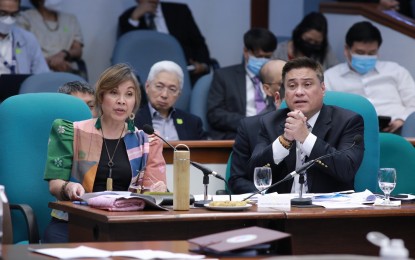
CONCURRED. Senate President Juan Miguel Zubiri (left) and Senate Pro Tempore Loren Legarda successfully defend Senate Resolution 485 concurring in the ratification of the Regional Comprehensive Economic Partnership Agreement on Tuesday (Feb. 21, 2023). Twenty of the 24 senators voted to ratify RCEP while one abstained, one voted against RCEP and two were not present. (Photo courtesy of Senate PRIB)
MANILA – The Senate on Tuesday evening concurred in the ratification of the Regional Comprehensive Economic Partnership (RCEP).
A total of 20 senators voted in favor of Senate Resolution 485 (SR 485) ratifying the biggest free trade agreement (FTA) between the Association of Southeast Asian Nations (ASEAN) and its five FTA partners namely Australia, China, Japan, New Zealand and South Korea.
ASEAN member states include Brunei, Cambodia, Indonesia, Laos, Malaysia, Myanmar, Singapore, the Philippines, Thailand and Vietnam.
Minority Senator Risa Hontiveros voted against RCEP while Senator Imee Marcos abstained. Senators Pia Cayetano and Francis “Chiz” Escudero were not present during the voting
Senate President Juan Miguel Zubiri and Senate President Pro Tempore Loren Legarda co-sponsored the resolution.
During the interpellation, Legarda guaranteed that the Senate will closely monitor the implementation of the agreement to allay the fears of micro, small and medium enterprises (MSMEs), science and technology, agriculture, trade and industry and other sectors.
She said resolutory clauses were included and made part of the concurring resolution to the RCEP agreement where there are measures enclosed that would include interventions to stimulate and support innovation.
Legarda, however, made it clear that determining the losers and winners from RCEP implementation would depend on the utilization of the parties.
“If the stakeholders will not utilize the gains in the RCEP agreement and to find the comparative advantage, then they will be affected by the competition,” she said.
READ: NEDA chief: RCEP to fuel PH economic growth
The sponsors of the SR 485 said an oversight committee shall be created to address the concerns of various sectors that will be directly affected by the free trade deal.
For his part, Zubiri expressed confidence that the Senate made the right choice as other neighbor countries have reaped the benefits of joining RCEP.
“This will put us on equal footing with our neighbors, rules and policies-wise. We will prevent trade diversion, and we will be giving our industries a fair chance at being truly competitive,” Zubiri said.
He also assured concerned groups, particularly in the agriculture sector, that the RCEP implementation will go hand in hand with developmental and capacity-building programs of the government.
“We have the full commitment of the executive to make RCEP work, and that starts with the successful implementation of developmental programs for various sectors, especially the agri sector,” Zubiri said.
“So, if we have to, let us double the budget for the agriculture sector, and let us make sure that the budget actually goes to the right programs,” he added.
With or without RCEP, Zubiri noted that a lot of problems still need to be addressed especially in the agriculture sector.
“We have to look at the totality of it. Let us fix our problems in the agri sector, while also giving our other industries a fair chance to grow under RCEP. And then, down the line, when we have adequately empowered our agri sector, they can also begin to take advantage of the benefits of RCEP," he said.
In November 2020, the Philippines signed RCEF which entered into force for other signatory countries on Jan. 1, 2022. (PNA)
